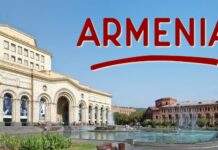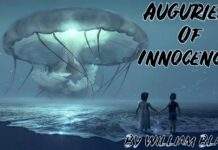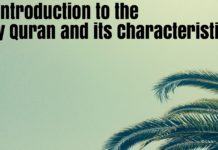Important Reference To Context Of Paradise Lost. The will learn that how to Write Explanation with Reference in Poetry. Some important parts taken from Text of John Milton‘s poetry briefly write below.
Paragraph No.1
Table of Contents
…Some cursed fraud.
Of enemy hath beguiled thee; yet unkown,
And me with thee hath ruined; for with thee
Certain my resolution is to die.
Explanation with Reference to the Context:
These lines have been extracted from the Book 9 of “Paradise Lost” written by John Milton. In these given lines under reference, we come to know that as Eve delayed in returning that fills Adam with suspicions and he worriedly went out in search of her with a garland of roses in his hands. He found it. Eve, near the ‘Tree of Knowledge’ with a bough of freshly plucked fruit in her hand. Watching all this, Adam’s heart filled with sorrow and anguish. But Eve started telling Adam about the seduction of Satan by her cheerfully;in which she ate the fruit of a forbidden tree. Here Adam does not show his reaction rapidly but feels that Eve has been ruined and lost totally. He also vows to eat the fruit and perish along with her because of his great love for her. Adam became stunned on hearing Eve’s story and started thinking that such a holy and divine creature like Eve should easily be tempted by the cursed enemy. Eve not only ruined herself but also ensured Adam’s ruin because he had resolved to die with her. Adam was afraid of the loneliness of the paradise and he had already requested God to give him a companion; and he was blessed with Eve by God. Adam also thought that if Eve died then he would have to live alone once again which he did not want to do because God had joined him in marriage with Eve. Adam was of the views that if God created another Eve yet the memory of this Eve would always haunt him because Eve was the flesh of his flesh, bone of his bone. So, we see that Adam is determined to live with her both in bliss and woe. In short, we can say that Adam shows his endless love for her and resolves to eat the fruit willfully because he cannot live without her.
Paragraph No.2
Regions of sorrow, doleful shades, where peace,
And rest can never dwell, hope never comes
That comes to all;….
Explanation with Reference to the Context:
These lines have been extracted from the Book 1 of “The Paradise Lost” written by John Milton. In the given selective lines, Milton draws the picture of the Hell in which Satan and his followers are to live forever. A very horrible and dreadful picture of Hell is drawn by Milton. It is a place like a horrible dungeon which is surrounded by fire on all sides and the flames of fire are very huge but these flames do not produce light because the damned are deprived of the sight of God who symbolizes light. A very dreadful and powerful image of darkness is created by Milton by using the word oxymoron ’darkness visible’. This powerful image of darkness creates an atmosphere of woe, sorrow, gloomy shadows and fears where peace, rest and calmness can never exist. Allah separates the light from the fire which symbolizes as the brightness of life while Satan and his followers are deprived of this brightness of life and they are dammed to the torture of the burning flames. Satan and his followers have waged an impious war against God and thus they have earned the wrath of God to be imprisoned in Hell which comprises ‘regions of sorrow’ and doleful shadows. It is a place of endless torture where unconsumed sulphur is burning for its denizens.
Paragraph No.3
Fallen cherub to be weak is miserable,
Doing or suffering; but of this be sure
To do aught good never will be our task
But ever to do ill our sole delight……
Explanation with Reference to the Context:
The selective lines have been taken from an epic poem “Paradise Lost” Book – 1, written by John Milton. The theme of this epic poem revolves around the fall of Adam and Eve; as a result of tasting the fruit of the forbidden tree. In reaction to Satan’s first speech to his comrades, Beelzebub (the angel of light and knowledge) presents a pessimistic and gloomy response before Satan. Satan regards it a weak and bad sign for him and for his other followers. He feels that it is a sign of weakness on the part of Beelzebub who regrets the terrible war under which consequences, they will be thrown from Heaven to Hell. Here, Satan boasts up Beelzebub’s morale and spirit by saying that he should give up weakness because it generates misery. Here, we see that inwardly Satan confesses that physically they are weaker than God. This very thing itself is a main cause of their disappointment and misery. But, in spite of his genuine confession, he excites and spurs up the spirit or morale of his comrades by saying that they have an indomitable will to never do good. They will always have to oppose God by doing ill deeds or things. Now, their main aim or task of doing all kinds of works or things is to feel delight in doing or acting contrary to the will of God.
Paragraph No.4
Of the fruit
of each tree in the garden we may eat,
But of the fruit of this fair tree a midst
The garden, God hath said, ‘ye shall not eat
Thereof, not shall ye touch it, Last ye die”
Explanation with Reference to the Context:
These selective lines have been extracted from an epic poem “Paradise Lost” Book 9, written by John Milton. This epic poem has been written on the theme of the fall of Adam and Eve; as a result of tasting the fruit of the forbidden tree. In the selective lines under discussion, Eve talks to Satan who has come before her in the guise of a serpent in the garden of Eden. Finding her alone, he excites and allures her to taste the fruit of the tree planted in the middle of the garden. In the response to Satan’s earlier address to her, Eve replies that God has commanded us not to eat the fruit of this tree. She says that they have been allowed to eat the fruit of every tree in this garden, but about the fruit of this beautiful and fair tree in the middle of the garden, God has commanded us by saying: “You shall not eat it; nor shall you touch it, lest you should die”. Eve means to say that if they taste or eat the fruit of this tree, their this act may bring an act of death in them; and they may not live long after this.
Paragraph No.5
Space may produce new worlds;
where of so rife there went a fame in Heaven that ere long.
Intended to create, and therin plant
A generateion whom his choice regard.
Should favour equal to the sons of Heaven.
Explanation with reference to the context:
The selective lines have been extracted from a long narrative poem “Paradise Lost”. Book I, written by John Milton. The subject or theme of this epic poem revolves around the fall of Adam and Eve after eating the fruit of the forbidden tree. In his earlier address to the fallen angels, Satan has already pointed out by saying that their previous defeat was due to the untried force of God. He further apprehends that now they might not be able to win an open war. In the selective lines under reference, Satan talk about the current humour in Heaven that God plans to create a new race equal in favour to the sons of Heaven. Here, Satan gets his followers intended to renew a revolt against God and for this, they all must visit to the world of the new race for having a detailed survey of it. The hidden intention of them here is an exercise of fraud and guile on this new race to avenge themselves. Actually, Satan excites his Flowers or comrades by saying that they will not tolerate their imprisonment in the infernal pit into which they have been fallen by God. Being celestial spirits, this place will not be suitable for them.
Paragraph No.6
Earth felt the wound, and Nature from her seat.
Sighing through all her works gave signs of woe,that all was lost
Explanation with reference to the context:
These lines have been extracted from the Book 9 of “Paradise Lost”, written by John Milton. In these lines under reference, Milton says that Satanic false and baseless argumentation of eating the fruit overcome Eve’s reasoning and she eagerly and keenly plucks and eats the fruit. Her this very act not only brings their fall but also a fall for all life on the earth. After her sinful act, Adam sees that the flowers he had picked for her had withered. Eve’s sinful act also affects the whole nature and she sighs through all her objects. Satan in the guise of serpent, slipped away secretly after achieving his vicious aim. The action of eating the forbidden fruit also showed its effect and Eve started acquiring the wisdom of differentiating between the good and the bad. She even thought that she might attain God-head that showed her to be guilty of the sin of gluttony.
Paragraph No.7
If them his providence
Out of our evil seek to bring forth good,
Our labour must be to pervert that end,
And out of goods still to find means of evil;
Explanation with Reference to the Context:
These lines have been extracted from Book 1 of «Paradise Lost” written by John Milton. We know that in his first speech Satan stresses on the angelic qualities; immortality and determination of his followers and asserts of waging an endless war against the tyrannical God. After listening to the first speech of Satan, Beelzebub replies that the spirits are immortal and with soon recover their diminished strength, but expresses his fear that God may use them as his thralls by the right of war and may employ them in his own service. In the response to the apprehensions of Beelzebub, Satan says that now, his and his own follower’s every effort will go against God’s designs and they all will always convert good into evil. Satan further speaks about the providence of God and asserts that if God’s providence aims at bringing good out of their evil then they must try their best to prevent this attempt and bring evil out of good. Satan has dead sure that they all will certainly succeed in their efforts of upsetting God’s designs and his actions. Now, there is no doubt in saying that Satan’s arguments always show incarnate evil because he thinks nothing else except of evil. It is also very evident now that once he has chosen the path of wickedness, he never ever wants to depart from it. He is absolutely an embodiment of pride and vanity.
Paragraph No.8
Trice he assayed, and thrice, in spite of scorn
Tears, such as angels weep, burst forth: at last
Words interwove with sighs found out their way;
Explanation with Reference to the context:
These lines have been extracted from Book 1 of “Paradise Lost” written by John Milton. In this long narrative and epic poem, John Milton tells about the fall of Adam and Eve from the Heaven. It was caused due to man’s disobedience to Allah’s command of not eating the fruit of forbidden tree. In the form of serpent, Satan excited or tempted Eve after finding her alone in the Garden of Eden. After being tempted by Satan, Eve plucked the fruit of the forbidden tree with her own hands and ate it relishly. After eating it, she goaded or persuaded Adam to eat it so that they both may remain companions in eating it.
Explanation:
In the selective lines under reference, Satan and his followers are describing their past glory in heaven. Later, their glory and charms of body were lost due to Satan’s disobedience to the command (orders) of Allah. Satan observed that even with the faded glory of their bodies, his -followers were still loyal and devoted to him. As Satan intended to address them, they all came close to one another and circled around Satan. They all have prepared themselves attentive to listen to the speech of Satan. Thrice, he attempted, and thrice though he hated him strongly for such weakness, in an angelic manner, he started weeping and tears started falling from his eyes. As a result, words mingled with sighs and grieves for finding out their way.
































